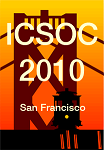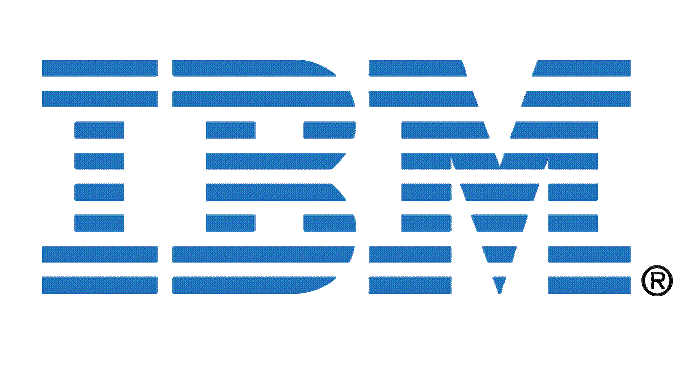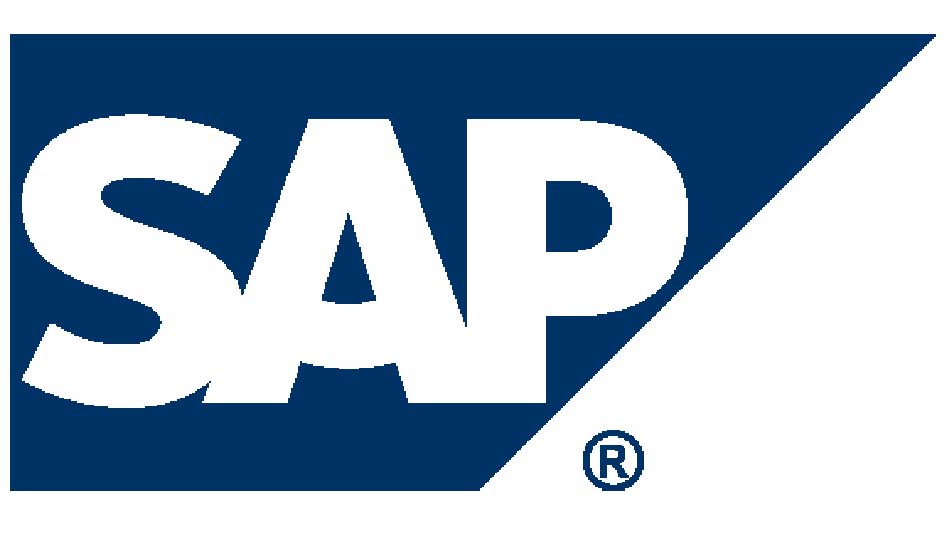
The Eighth International Conference on Service Oriented Computing
December 7-10, 2010, San Francisco, California
Workshops

ICSOC Workshop papers will available as a joint workshops post-proceedings in the Springer LNCS Services Science Subline.
The main goal of this Workshop on Performance Assessment and Auditing in Service Computing is to bring together researchers, practitioners and industry representatives, providing them the opportunity to present recent research and development results, discuss lessons learned, and present novel ideas on topics in the area of performance assessment, business modeling and auditing in service computing.
The submission of papers describing research and development work on technical, business and economic related aspects on service computing is encouraged, e.g., new concepts and approaches related to business modeling and performance assessment, auditing techniques, tools and systems providing practical implementations supporting such models and approaches. In addition, we are also interested in application papers discussing the power and applicability of these methods and techniques to real-world problems. This Workshop encourages papers presenting novel research and developments, and particularly values the practical experience gained from designing, building and using services.
Submissions of original and unpublished works are invited, including research, theory, and applications.
Topics of interested include but are not limited to:
-
Business modeling in service computing (e.g., design, specification, operational processes and policies, value configuration, technical cost modeling, formal modeling for core aspects on business in services)
-
Economics of service computing (e.g., cost models, cost-benefit analysis)
-
Audit in service computing
-
Quality of services
-
Design, implementation, monitoring and evaluation of services
-
Strategies and strategic decisions for services (e.g., concerning optimal resource utilization; service selection criteria)
-
Analytics of services
-
Methods, frameworks and methodologies synthesized for services performance assessment (e.g., performance indicators, benchmarking methods, frameworks)
-
Life-cycle management aspects on service computing
-
Self-management aspects for services (e.g., instant management of assigned resources)
-
Theories and approaches synthesized for services representation and formal modeling, and their economics (e.g., cost transaction economics)
-
Performance predictability in service computing.
Workshop Chair and Organizer:
Claudia-Melania Chituc
Assistant Professor, Department of Informatics
Engineering - Faculty of Engineering of the University of Porto, Portugal
(FEUP-DEI)
E-mail: cmchituc@fe.up.pt
6th International Workshop on Engineering Service-Oriented Applications 2010) - WESOA
WESOA Workshop Website: www.wesoa.org
Many of today's large-scale software projects in the area of distributed systems and especially enterprise IT adopt service-oriented software architecture and technologies. For such projects, availability of sound software engineering principles, methodology and tool support is of utmost importance. However, traditional software engineering approaches are not fully appropriate for the development of service-oriented applications. The limitations of traditional methods in the context of service-oriented computing have led to the emergence of Software Service Engineering (SSE) as a specialist discipline, but research in this area is still immature and many open issues remain. There is a need for research community and industry practitioners to develop comprehensive engineering principles, methodologies and tools to support the entire software development lifecycle of service-oriented applications. WESOA 2010 is the sixth in a series of workshops that focus on the specific aspects of SSE. Our aim is to facilitate exchange and evolution of ideas on SSE topics across multiple disciplines as well as to encourage participation of researchers and practitioners from academia and industry. This collaboration will be facilitated by a highly interactive and fast-paced workshop format.
WESOA 2010 encourages a multidisciplinary perspective and welcomes papers that address general or domain-specific challenges of SSE. Workshop topics of interest include, but are not limited to the following:
- Software service development lifecycle methodologies & processes
- Distributed & collaborative software service development
- Service-oriented reference models & framework
- Architectural styles & standards for software service systems
- Management & governance of SSE projects
- Models, languages & methods for service-oriented analysis & design
- Costing, valuation & quality metrics of software service design
- Requirements-engineering for software service systems
- Service-oriented business process modelling & management
- SSE for cloud computing environments (incl. IaaS, PaaS & SaaS)
- Validation, verification & testing of software service systems
- Service assembly, composition and aggregation models & languages
- Model-driven SOA & service systems development
- Reverse engineering of software service systems
- Tool support for software service engineering
- Case studies & best practices of service-oriented development
- SSE for context-awareness & mobile devices
ORGANIZING COMMITTEE
-
George Feuerlicht, Prague University of Economics, CZWinfried Lamersdorf, University of Hamburg, DEGuadalupe Ortiz, University of Cádz, ESChristian Zirpins, Karlsruhe Institute of Technology, DE
International Services, Energy, and Ecosystem (SEE 2010)
Homepage: http://see.ws.dei.polimi.it/SEE 2010 workshop aims to bring together researchers and practitioners in multidisciplinary research fields working on energy consumption and efficiency related topics. SEE 2010 focuses on creating sustainable (green) energy-efficient services and fostering the growth towards a new eco-friendly world of services.
SEE 2010 welcomes research submissions on all topics related to Services, Energy, and Ecosystems, including but not limited to those listed below.
ENERGY ORIENTED SERVICE ENGINEERING
-
Sustainable Service Engineering
-
Sustainable Service Management
-
Adaptive Service Designing
-
Energy-efficient Service Provisioning
-
Energy-efficient Networking and Protocols
-
Energy-efficient Resources Utilization
-
Energy Optimization in Application system and Storage systems
-
Energy Efficiency in Large Scale Distributed Systems
-
Grid/Cloud/Data Center Technology as Sustainability/Greenness Enablers
-
Virtualization/consolidation
-
Energy-efficient Methodologies for Infrastructure as a Service/Platform as a Service/Software as a Service Models
-
Efficient Cooling and Power Distribution
-
Service Resources Modeling and Management
-
Service Composition and Energy Consumption Analysis
-
Green Service Life Cycle Management
-
Service Orientation in Data centers
MEASURING, MONITORING, AND MANAGING ENERGY-AWARE SERVICES
-
Key Performance Indicators and Green Performance Indicators
-
Energy and Performance Profiling
-
Tools and Techniques for Monitoring Energy
-
Performance and Quality of Service Trade-off
-
Energy Consumption and Energy Efficiency Analysis
-
Facility Monitoring/Measurement Approaches
-
Service/Process Mining
-
Sustainability Scorecards
-
Sustainability Auditing
-
Green Certificates
-
Green Maturity Models
SERVICES AND ENERGY PERSPECTIVES IN ORGANIZATIONS / SOCIETY
-
Service Chain Management
-
Energy use and Total Cost of Ownership
-
Service Economics
-
Energy Efficient Services procurement/Acquisition,
-
After-Sales Services
-
Business Models for Sustainable Services
-
Corporate Social Responsibility
-
Environmental Compliance and Legal Regulations/Policies
-
Risk Management, Organization culture and Energy Use
-
Knowledge Management for Service
-
Best Practices for Sustainable/Green Services
-
Public and Private Sectors Practices and Experiences (case studies)
ORGANIZERS
-
Schahram Dustdar, Technical University of Vienna, Austria
-
G.R. Gangadharan, Politecnico di Milano, Italy
-
Patricia Lago, VU University Amsterdam, Netherlands
-
San Murugesan, University of Western Sydney, Australia
-
Barbara Pernici, Politecnico di Milano, Italy
Homepage: http://soclog10.wifa.uni-leipzig.de/The focus of this workshop is the study and exploration of the SOC's potential to solve coordination problems in logistics systems and supply chains. Key research questions are: (1) How to represent logistics systems in service-based computing systems by employing and adopting constructs, models, and methods of the SOC technology stack, (2) how to describe software-based logistics services with service description languages, (3) how to coordinate software-based logistics services, by employing and adopting approaches for service discovery and service composition, (4) how to negotiate and agree about the delivery of software-based logistics services with approaches for SLA representation, SLA management, and SLA negotiation, and (5) how to control the delivery and how to measure the efficiency and effectiveness of software-based logistics services? With the set of design principles, architectural models and concepts and last but not least with its existing and growing set of standards, SOC promotes adaptiveness of logistics systems and supply chains, a flexible and re-configurable provisioning along multiple supply chains, and their efficiency. Therefore, the purpose of the workshop is to present and discuss recent significant developments at the intersection of service-oriented computing and logistics systems/supply chain management, and to promote cross-fertilization and exchange of ideas and techniques between these fields.
In particular, we are inviting papers on the following topics:
LOGISTICS SERVICES REPRESENTATION-
Servicetization of logistics system
- Logistics service models
- Reference models for logistics services
- Semantic models for logistics services
- Repositories and dictionaries for logistics services
LOGISTICS SERVICES DESCRIPTION-
Syntactical description of logistics services
- Semantic description of logistics services
- Logistics ontologies / ontologies for logistics services
- QoS attributes of logistics services
COORDINATION OF LOGISTICS SERVICES-
Discovery of logistics services
- Composition of logistics services
- Orchestration and choreography of logistics services
- Market-based coordination of logistics services, i.e., auctions, exchanges
SLA MANAGEMENT OF LOGISTICS SERVICES-
Domain-specific SLA models
- Semantic annotation of SLAs for logistics services
- SLA negotiation protocols for logistics services
- Pricing of logistics services
- Integrating logistics services into SLA management infrastructures
DELIVERY OF LOGISTICS SERVICES- Logistics service runtime management and monitoring
- Verification of logistics services
- Simulation and optimization of logistics services
- Transactional safeguarding of logistics services
- Service-oriented architectures for the setup and enactment of logistics services
ORGANIZERS-
Joerg Leukel, University of Hohenheim, Germany
- André Ludwig, University of Leipzig, Germany
- Alex Norta, University of Helsinki, Finland


